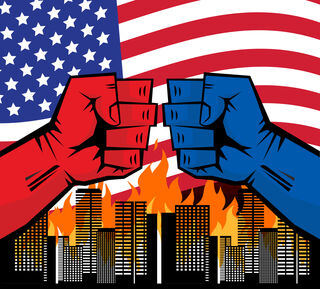Anger
When We Are Consumed With Anger and Hate, We Are Wrong
In our polarized country, we are wrong when we are consumed with anger and hate.
Posted January 9, 2021 Reviewed by Ekua Hagan
I don't claim that what I say is totally "true," because the truth is elusive in this complicated world! Rather, I'm offering some ideas to help perceive these problems in a more flexible manner that opens pathways for change and growth.

Americans experienced a collective traumatic event on Jan. 6, 2021, as a Trump-supporting mob stormed the U.S. Capitol to disrupt the certification of the electoral votes for President of the United States. The Constitution and the very democratic foundations of this country were under assault. Five people died in the siege on the Capitol and many more were injured. Fortunately, Congress, and democracy, were not to be deterred. Our Congress bravely continued the certification process after order was restored and officially confirmed Joe Biden as the next President of the United States of America.
One of the many qualities that makes America so great is that we have a Constitution and a built-in system of checks and balances, including a legal/court system, to ensure that we can maintain a thriving democracy. We are not a country to be ruled by a mob fueled with feelings of anger and hate. Yet, the uncomfortable truth is that many (most?) of us have been consumed by feelings of anger and hate toward the opposing political party more and more over the past few election cycles.
We have witnessed a growing partisan divide and hostile rhetoric in recent decades that make the storming of the U.S. Capitol unsurprising. We have increasingly become a country of "us" vs. "them." In this dualistic framework, "we" are the ones who are right ... the "good guys" ... and "they" are wrong and the "bad guys." Yet, on some level, we all know this cannot be true. The world in all of its infinite complications does not fit neatly into discrete categories such as good/evil, right/wrong, true/false, or Republican/Democrat.
"Make it easy on yourself, there's nothin' more you can do. You're so full of what is right, you can't see what is true." —"The Color of Right" by Rush
Like it or not, we are in these United States together but, right now, it's like we are in a bad marriage. Try telling your partner during a domestic dispute that you are always right and they are always wrong and see where that gets you! Relationships don't work this way, much less wicked problems such as those we find in politics.
Despite knowing this truth on some level, our partisan divide has grown into a chasm. Each side points their collective finger at the other and blames them as being at fault for our societal ills. We increasingly dislike, distrust, and fear those from the opposing political party in what is known as affective polarization. Those people are deluded, deranged, wrong, or even evil. Yet, each side is, in the broad sense, guilty of the same transgressions.
We, and our country, will suffer if we don't learn to reduce our negative partisanship. Somehow, we need to learn to get along with one another despite our political differences. When we are able to effectively balance and blend the diversity that is endemic to America, like a metal alloy, we are made stronger as a nation.
Deep down, we are more alike than different. We all want to be happy, and we don't want to suffer. The happiness we seek is not really pleasure but more like contentment. Although we ultimately desire peace, there is an intoxicating allure of bonding with our group over being "right" and hating the "other" side for being wrong. Ironically though, when we are filled with anger and hate, we are the ones who are in the wrong. Moreover, we create greater suffering for others and ourselves.
Be Peace to Make Peace
Buddhist monk and teacher, Thich Nhat Hanh, has written many lovingly thoughtful and inspiring works including Being Peace. A powerful message contained within Being Peace is that in order to make peace, we need to first be peace. Thus, when we are consumed by feelings of anger, rage, and hate, we end up spreading more of the same. This is even if our underlying intentions are good.
"If we are not happy, if we are not peaceful, we cannot share peace and happiness with others, even those we love, those who live under the same roof." –Thich Nhat Hanh from Being Peace
Our feelings can spread to others, for good or ill in a process known as emotional contagion. Thus, feelings of anger and hate color our words and actions and affect those around us. Raging at others stirs rage within them. Hate begets hate. In a karmic fashion, it often comes back to hurt us. We reap what we sow.
Of course, we can identify particular instances in which one side was more at fault than the other. However, self-righteously pointing out the wrongdoings of one side usually just fuels resentment in them that is projected back onto us. Have we seen enough of this vicious cycle to want to change it?
"The only winning move is not to play." —WarGames
I believe both conservatives and liberals want a peaceful, prosperous, and happy America. We might have different ideas about exactly what that looks like and how to do it, but of course, we do. Life is complicated! Yet, we keep falling into the trap of "I am right" and "you are wrong." We fear that the other side is going to destroy what we hold dear, which then justifies our anger and hatred toward them.
But this is where we are wrong, and we need to heed the wisdom of Thich Nhat Hanh. We cannot obtain the peace that we desire when we ourselves are consumed by anger and hate. We must first be peace in order to make peace. From this perspective, we can know that we are wrong when we are filled with feelings of anger and hate. To be clear, we can still have values and work for positive change, but we don't allow ourselves to be engulfed by the fires of rage. Such flames will spread and destroy what we touch.
Invariably, someone will bring up Adolf Hitler and Nazi Germany and say, "Ah, we didn't want peace with them! They were evil! We needed to defeat them ... so you are wrong!" As I've said before, there are few absolutes in this world and none of what I say is 100% true in all cases at all times. What I'm talking about is not hating a hundred million fellow Americans because they identify with a different political party. Sure, one can always offer a straw man argument to make a point, but this kind of thinking keeps us caught in the trap of anger and hate from which we must liberate ourselves.
The Takeaway?
If we want a more peaceful and prosperous America, we mustn't view those on the other side of the political fence as enemies. They are not the true enemy. The enemy is within: It is our own anger and hatred. Well, we even have to be careful there because if we hate the hate within us, that can itself cause problems! We need to recognize such feelings within us and work to transform them.
The change starts with us. Until we realize this, we will continue down a dark path. None of us want to go where this dark path takes us. Do we want a better America? Every time we are consumed by feelings of anger or hate, we must recognize that such feelings are the root of the problem. We must find a way to make peace within ourselves. That's how to better ourselves and America because these two will always be entwined in these United States.




